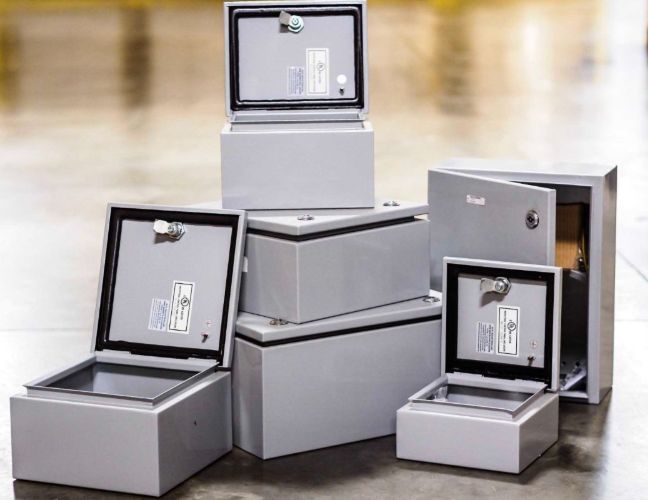New commercial or residential electrical work will require a wide range of electrical enclosures, including receptacle boxes. These handy boxes come in rectangular, square, or round shapes and can hold either single-gang or double-gang outlets. Today, electricians also have a wider choice of receptacle box materials. Metal boxes are being replaced by plastic versions, with polycarbonate receptacle boxes outperforming other plastics in strength to weight comparisons.
Polycarbonate Electrical Boxes vs PVC
You will find non-metallic electrical boxes constructed of polycarbonate, PVC, ABS, and other FRP or fiberglass reinforced polymers. ABS and FRP are premium, engineering materials that are cost-prohibitive when considering a large quantity of receptacle boxes for new electrical installations. While PVC and polycarbonate are both thermoplastics, polycarbonate has a higher melting point and is often used for fire-rated electrical boxes.
Also, polycarbonate has excellent impact resistance when compared to PVC, which can shatter easier because it is more brittle. When it comes to outdoor protection from rain, wind, and sleet, polycarbonate provides better weather resistance also.
While plastics like PVC are highly flammable, polycarbonate is self-extinguishing, and you don't have the toxic off-gassing of fumes like PVC and other plastics.
Advantages of polycarbonate over metal
When it comes to electrical components, weight equates to increase costs. The first advantage of polycarbonate receptacle boxes is how lightweight they are -about half the weight of metal electrical boxes. Also, the edges of polycarbonate receptacle boxes are smoother and softer, and their holes are easier to knock out. All these features make polycarbonate boxes easier and faster to install when compared to metal boxes.
Polycarbonate receptacle boxes are also faster to manufacture. That means you have a shorter lead time for orders to be filled for large quantities of receptacle boxes, which can be common for commercial construction. The manufacture of polycarbonate electrical boxes is less labor intensive. Plastic thermoforming saves on labor costs, energy, and equipment run when compared to electrical components manufactured from metal.
Non-metallic boxes like polycarbonate will not conduct electricity. The many advantages of this property include installation of polycarbonate electrical boxes outdoors or near water and the elimination of a box ground wire.
Polycarbonate, as a type of thermoplastic, does not conduct electricity (unlike metals which are good conductors of electricity), which gives it an advantage when the enclosure is needed near water. And when it comes to holding up under impact, metal boxes will dent which can start the process of rust or corrosion, while polycarbonate boxes have excellent impact resistance.
When specifying components for your next electrical installation, consider the many benefits of polycarbonate receptacle boxes over other plastics like PVC and even metal:
- corrosion and rust resistant
- flame resistant and self-extinguishing
- lighter material with smooth edge
- holes are easier to knock out
- withstands high impact
- can be used near water
- easier to field install
For a wide selection of polycarbonate receptacle boxes, visit Allied Moulded Products Inc. We specialize in non-metallic electrical enclosures for residential, commercial, and industrial applications. Our nonmetallic enclosures protect against the toughest environments, and we carry an extensive inventory of sizes from small junction boxes to large free-standing cabinets.







